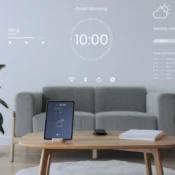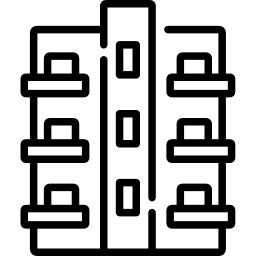The Rise of Smart Homes: How Technology is Transforming Real Estate

The Rise of Smart Homes: How Technology is Transforming Real Estate
The real estate industry is undergoing a significant transformation as technology becomes more deeply integrated into homes, creating a new wave of “smart homes.” These homes, equipped with advanced automation systems, sensors, and AI-driven technologies, are changing the way people live, interact with their environment, and even how properties are bought and sold. The smart home revolution is not just a trend; it’s a glimpse into the future of real estate, where technology enhances convenience, security, energy efficiency, and even home value.
In this blog, we’ll explore how the rise of smart homes is reshaping the real estate landscape, the technologies driving this change, the benefits and challenges of smart home integration, and what the future holds for homeowners, real estate professionals, and developers alike.
1. The Evolution of the Smart Home
Smart homes have come a long way from the early days of simple automation systems. The concept of home automation has existed since the mid-20th century, but it wasn’t until the advent of the internet and connected devices that the dream of a fully automated, intelligent home began to materialize.
The idea of a smart home is rooted in the Internet of Things (IoT), where everyday devices are interconnected via the internet, allowing for remote control and monitoring. From smart thermostats that learn your schedule to security systems that notify you of suspicious activity, the possibilities of IoT in the home are vast and growing.
Initially, smart home technology was considered a luxury. Early adopters were often tech enthusiasts or high-income homeowners. However, as the cost of technology has decreased and its benefits have become more apparent, smart home devices have become mainstream. In 2024, smart homes are no longer futuristic; they are the present, with millions of homes across the globe equipped with some form of automation.
2. Key Technologies Driving Smart Homes
Several key technologies form the backbone of smart homes. These innovations are not just about convenience; they also offer greater energy efficiency, safety, and customization for homeowners.
a. Smart Lighting Systems
Smart lighting systems allow homeowners to control the lighting in their home via smartphone apps, voice commands, or automated schedules. These systems can adjust brightness, color, and even turn off lights when rooms are unoccupied, reducing energy consumption. Integrations with systems like Amazon Alexa or Google Home enable seamless control via voice commands, adding a new layer of convenience.
b. Smart Thermostats
Energy efficiency is a major draw for smart home technology, and smart thermostats are at the forefront of this push. Devices like the Nest Thermostat and Ecobee learn your daily routines and adjust the temperature accordingly. By regulating heating and cooling based on occupancy, smart thermostats can significantly reduce energy bills and promote sustainable living.
c. Voice Assistants
Voice assistants, such as Amazon’s Alexa, Apple’s Siri, and Google Assistant, act as central hubs for many smart home systems. These assistants can control everything from lighting and heating to playing music and answering questions. They can also integrate with other smart devices, creating a unified smart home experience that can be managed via voice commands.
d. Smart Security Systems
Home security has also seen a dramatic upgrade with smart technology. Homeowners can now monitor their properties in real-time via security cameras, motion sensors, and smart locks. Smart doorbells like Ring allow homeowners to see and communicate with visitors remotely. These systems can send alerts to your phone, giving peace of mind and enhancing overall safety.
e. Home Automation Hubs
Automation hubs act as the command center for a smart home, linking various devices and systems together for easy control. Popular hubs include Samsung SmartThings and Apple HomeKit, which enable seamless integration between smart devices, ensuring that lighting, temperature, and security systems work together.
f. AI and Machine Learning
AI and machine learning have enhanced the capabilities of smart home devices by allowing them to learn and adapt to user behavior. For example, smart refrigerators can track food usage and suggest grocery lists, while AI-driven home assistants can predict user preferences, making the home experience increasingly personalized.
3. How Smart Homes are Reshaping the Real Estate Market
Smart homes are not only transforming how people live but also how properties are marketed, sold, and valued. From an investment perspective, the real estate industry is beginning to recognize that smart home features add value, making properties more attractive to potential buyers.
a. Increased Home Value
A growing body of research shows that smart home features can increase the resale value of a property. Homebuyers are increasingly looking for homes that come with modern conveniences such as automated lighting, security systems, and energy-efficient appliances. These features can set a property apart in a competitive market.
According to a study by Coldwell Banker, about 44% of homebuyers said they would pay more for a home with smart technology. In particular, millennials—who make up a significant portion of the home-buying market—are driving demand for smart homes, viewing them as essential rather than a luxury.
b. Enhanced Marketing Opportunities
For real estate agents and developers, marketing a smart home offers a unique selling point. The inclusion of smart home features can make a property stand out in listings and provide an opportunity to demonstrate cutting-edge technology during open houses. Virtual tours of smart homes can now include demonstrations of voice-activated lighting, security monitoring, and automated climate control, offering an immersive experience that captures the buyer’s imagination.
Smart home technology also enables remote management, making it easier for real estate agents to monitor and manage multiple properties. They can control access to homes, adjust climate settings before viewings, and ensure security remotely.
c. Remote Buying and Selling
Technology has also revolutionized the real estate transaction process. Smart homes, equipped with cameras, sensors, and remote access tools, allow potential buyers to explore homes virtually. With smart locks, agents can grant temporary access to buyers for self-guided tours, reducing the need for in-person showings.
Additionally, digital contracts, remote notarizations, and virtual meetings have streamlined the home buying and selling process, making it more efficient and accessible, particularly for out-of-state or international buyers.
4. The Benefits of Smart Homes for Homeowners
The advantages of smart home technology extend beyond convenience; they also provide practical benefits that improve the quality of life for homeowners.
a. Energy Efficiency
One of the most significant benefits of smart homes is energy savings. Smart thermostats, energy-efficient lighting, and automated systems reduce waste, optimizing energy consumption based on need and occupancy. For eco-conscious homeowners, smart homes align with a more sustainable lifestyle, minimizing their carbon footprint.
b. Enhanced Security
Smart security systems offer advanced protection compared to traditional systems. With smart cameras, motion sensors, and door locks, homeowners can monitor and control access to their homes remotely. They receive real-time alerts about any suspicious activity, providing peace of mind, whether they are home or away.
c. Convenience and Comfort
From automated lighting to voice-controlled assistants, the convenience offered by smart homes is unparalleled. These technologies make everyday tasks easier, allowing homeowners to control their environment with minimal effort. Whether it’s adjusting the thermostat from bed or having coffee ready when you wake up, smart home devices elevate comfort and lifestyle.
d. Health and Wellness
Smart homes can also contribute to health and wellness. Devices like air quality monitors, water filtration systems, and smart mattresses are designed to improve indoor environments and personal well-being. For example, smart air purifiers automatically adjust based on pollution levels, while health-focused smart devices track sleep patterns and offer insights into improving rest.
5. The Challenges of Smart Homes
Despite the many benefits, there are also challenges associated with the rise of smart homes.
a. Privacy Concerns
With increased connectivity comes the risk of privacy breaches. Smart home devices collect vast amounts of data on user behavior, raising concerns about who has access to that data. Hackers could potentially access sensitive information or gain control of smart devices, compromising security. Ensuring that smart devices have robust encryption and privacy settings is essential for mitigating these risks.
b. Compatibility Issues
With numerous manufacturers and platforms offering smart home products, compatibility can be a challenge. Homeowners may need to invest in specific hubs or devices to ensure all their smart systems work together seamlessly. As the market matures, standardization will be critical to ensuring a consistent user experience.
c. Cost
While smart home devices are becoming more affordable, the initial investment can still be prohibitive for some homeowners. High-end smart systems, in particular, can be expensive, and retrofitting an older home with new technology may require significant upgrades.
6. The Future of Smart Homes and Real Estate
The future of smart homes is bright, with technology continuing to evolve at a rapid pace. AI-driven automation, improved energy solutions, and enhanced security features will likely become standard in homes. For the real estate industry, this means adapting to new buyer expectations, as smart homes become a critical factor in property value.
Looking ahead, we may see fully autonomous homes that adjust their environments based on AI predictions, further integration of renewable energy systems, and even smart cities where homes, infrastructure, and public services are interconnected.
a. AI-Powered Homes
As AI becomes more advanced, homes will become more intuitive, learning from user behavior and making real-time adjustments. Imagine a home that automatically orders groceries when the refrigerator is empty or adjusts lighting based on the time of day and mood. AI will also enhance security, making it more predictive and responsive to potential threats.
b. Sustainability and Energy Solutions
Smart homes will continue to play a vital role in the push for sustainability. Solar panels, energy storage solutions, and water conservation systems will become more integrated into smart home ecosystems. Homes will not only consume less energy but also produce and store their own, contributing to a more sustainable future.
c. Smart Cities and Communities
Beyond individual homes, the concept of smart cities is emerging. In these communities, homes, transportation systems, public services, and infrastructure are interconnected through technology. This level of integration will lead to greater efficiency, improved quality of life, and more sustainable living environments.
Conclusion
The rise of smart homes is transforming the real estate industry in profound ways. Technology is no longer just an add-on feature; it is becoming a fundamental aspect of modern homes. From increased property values to enhanced living experiences, smart homes offer numerous benefits for homeowners and investors alike. However, challenges such as privacy concerns, compatibility, and cost must be addressed as the market continues to grow.
As technology advances, smart homes will become more personalized, efficient, and sustainable, shaping the future of real estate and the way we live. Whether you’re a homeowner, real estate professional, or developer, understanding and embracing this shift is crucial for staying ahead in a rapidly evolving market. The smart home revolution is here, and it’s reshaping the very foundation of how we think about real estate and the homes of tomorrow.




 Villas
Villas Resorts
Resorts Plots
Plots Lands
Lands Cottages
Cottages Flats
Flats Studio Apartments
Studio Apartments Residential Property
Residential Property Commercial Property
Commercial Property New Projects
New Projects Rishikesh
Rishikesh Sales & Marketing
Sales & Marketing Project Planning
Project Planning Land Acquisition
Land Acquisition Investment Banking
Investment Banking Hospitality
Hospitality Leasing
Leasing
















